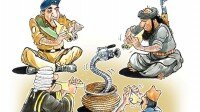Dr Tahir-ul-Qadri swept on to the Pakistani political landscape like a tropical hurricane, hit landfall in Islamabad, and dissipated after taking a toll on the government. But did he achieve substantive?
The jury may still be out, but one thing is clear: Dr Qadri rattled the leadership and forced it to make concessions. The document signed by him and the official delegation may not amount to much, but it is a testament to Dr Qadri’s success in setting an agenda and having it formalized by the government.
All this however came much later. The original question was, and remains, who is behind the Qadri phenomenon? Establishment? Zardari? Musharraf? U.S.? U.K.?
Or none of the above?
The answer remains as elusive today as it was when Qadri swept into Lahore and rocked the city with a mammoth rally at Minar-e-Pakistan. Elusive answers give birth to conspiracy theories and such theories have a strange habit of gaining traction in this land of ours. Their intensity reached a crescendo during the long march, but they continue to simmer at low boil even as Qadri is safely back in his Lahore enclave.
Qadri’s own person and background have further fanned these theories. His dual nationality, international connections, a seemingly unlimited supply of funds, and his appearance out of nowhere with a ferocious determination to smash the political status quo, all these factors have fed into the controversy surrounding him — and his message.
In practical terms, Qadri may not have achieved much. The promised revolution never materialized; the parliament was never stormed; the government was never pulled down and thrown at the mercy of the mob. None of this happened, and in many ways the status quo that Qadri wanted to obliterate, still holds strong. As things stand now, elections will be held on time, and most familiar faces from familiar political parties will return to populate the parliament.
Forces of Continuity have held their own against the Forces of Change.
But a few trends are now apparent. Qadri drew tens of thousands of people to Islamabad. These men, women and children braved four bitterly cold nights of the capital under the sky to register a message: Improve the system. This, here, was not an unruly mob trucked into the city against its wishes.
As the electronic media showed, these people were primarily urban, educated, and committed to a cause and a message. Sure many of them – perhaps a majority – had some affiliation with Qadri and his organization, but this does not dilute the credit they must get for what they endured with passion and resilience.
For whatever it is worth, these tens of thousands of Pakistanis together sent a very loud and clear message to all who want to hear: We want a better Pakistan.
By doing so, they — and many hundreds of thousands like them who were not present at D Chowk — have defined a wide space that exists between two extremes: Military rule and the present form of democracy.
The traditional debate in Pakistan has revolved around these two models. Military strongmen have justified their rule by demonizing the elected representatives and their misdeeds. The electables on their part have justified their misrule by arguing that the alternative is a return to dictatorship.
This seesaw has gone on since 1947 as a result of which Pakistan — more than six decades after its birth — remains an impoverished, illiterate, violent and misgoverned state, a pale shadow of the dream that once defined the country it was meant to be.
A growing number of Pakistanis are now saying: enough is enough. We don’t want to be ruled by the military, but neither can we accept a democratic system which caters to the elite and their families, and which is marked by a near absence of governance.
The system as it exists must be reformed, and opened up, so a better cadre of people can make it to leadership positions and take tough decisions to revamp the crumbling governance structures.
These people are right. Sans major reforms, Pakistan is headed towards a bleak future. The dilemma however, is that the mainstream parties have very little to offer in terms of basic and fundamental structural reforms. They are deeply rooted in the politics of patronage and kinship; and in such brand of politics the spoils of power trickle down to those who have proximity to power. Elections alone do not promise to deliver a revolutionary new leadership. The depressing conclusion that many Pakistanis now draw is that better days do not shimmer on the horizon.
Whatever Qadri’s credentials, whatever his agenda and whosoever his sponsors, the fact is that he drove home a crucial point: the present system must reform if it is to persevere. The messenger may be wrong, but his message was right.
This message is not new. Imran Khan has been saying the same thing for years and finally began to get a response late 2011. The whole concept of ‘Change’ is resonating with increasing intensity, and perhaps echoing the frustrations of millions of Pakistanis.
But will this message translate into votes? Therein lies the dilemma. Dr Qadri may fade into oblivion, and his long march may become a footnote in Pakistan’s political history, but the message he and his followers brought to Islamabad promises to stay for a long time.
The writer is a senior journalist and prominent talk show host based in Islamabad.
























